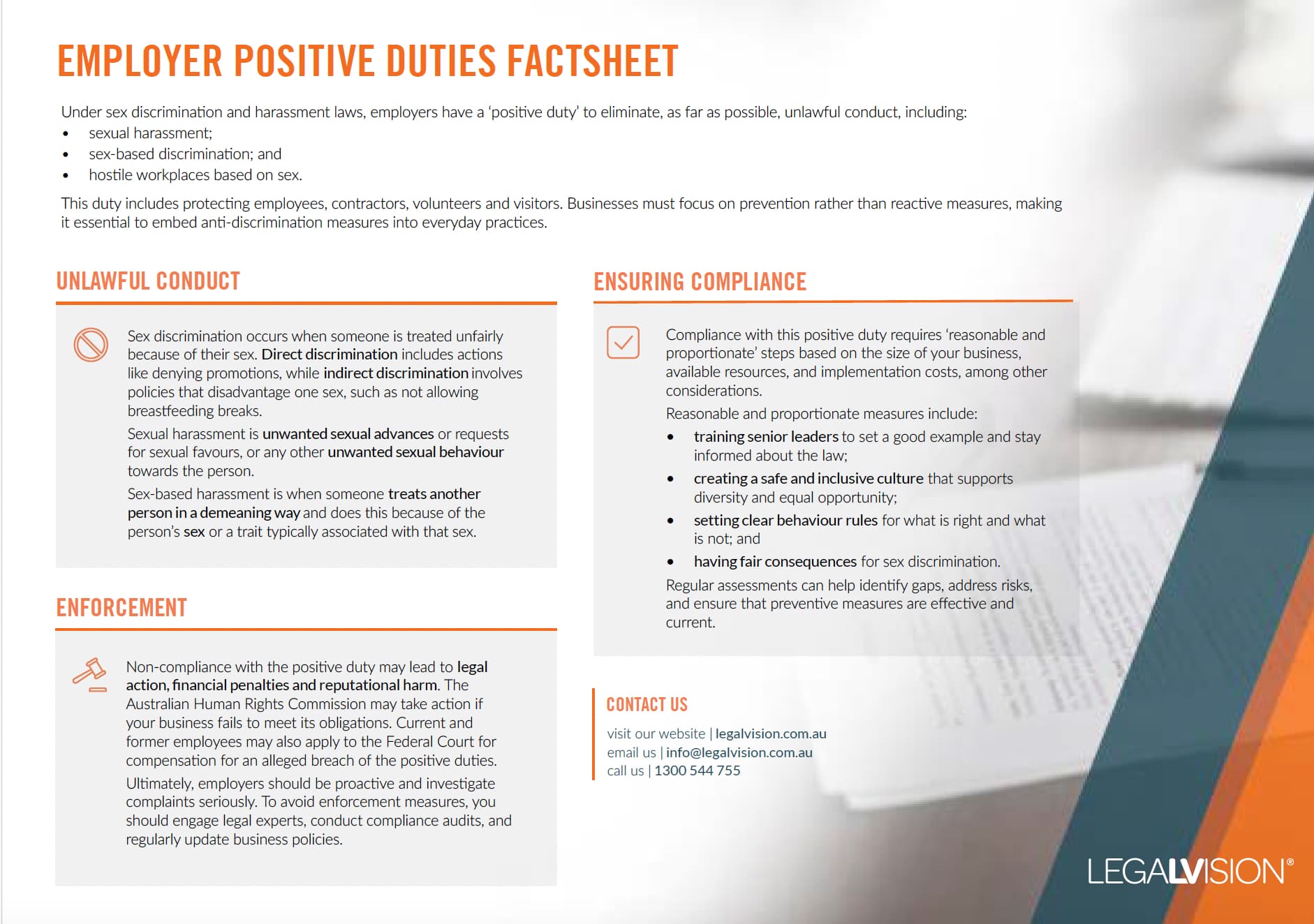In Short
- The national employment standards (NES) set 38 hours as the maximum weekly work hours for full-time employees, with additional hours permitted if reasonable.
- Factors determining reasonableness include employee health, role responsibilities, business needs and notice given.
- Overtime pay may apply depending on employment agreements and specific circumstances.
Tips for Businesses
Review employment contracts to align with NES requirements for maximum and additional hours. Clearly define reasonable overtime conditions, considering employee health, workload and adequate notice. Establish fair compensation terms for overtime to ensure compliance and support employee well-being.
As an employer, you may face situations where you need or expect your employees to work more than their usual hours. For example, you might need to meet an urgent deadline for an important project or prepare for the launch of an upcoming business event. In these circumstances, you may need to pay your employees overtime rates unless their additional work hours are reasonable. This article explains the:
- maximum weekly hours of work for your employees;
- factors that determine whether additional hours are reasonable; and
- your obligations regarding overtime payments.
What Are the Maximum Weekly Hours of Work?
The National Employment Standards (NES) set out the maximum weekly hours that an employee can work. These employment standards cannot be diminished by an award, registered agreement, or employment contract. The maximum weekly hours of work for different types of employees are outlined below:
| Type of Employee | Maximum weekly hours of work |
| Full-time employee | 38 hours |
| Other than a full-time employee (for example, a part-time employee) | Either 38 hours or your employee’s ordinary hours of work in a week (that is, normal and regular hours of work, which do not attract overtime payments). The maximum weekly hours will be applied to the lesser of the above factors. |
As a general rule of thumb, you must not request or require your employees to work more than the maximum hours in a week unless the additional hours are reasonable. Additionally, your employees may be entitled to refuse to work the additional hours if they are not reasonable.
What Are Reasonable Additional Hours?
There is no clear cut definition of ‘reasonable additional hours.’ What is reasonable will depend on you and your employee’s specific circumstances. A number of factors will affect whether the additional hours are reasonable, including:
- health and safety issues;
- risk to your employee associated with the additional hours (for example, stress or fatigue);
- the personal circumstances of your employee, such as family responsibilities;
- your employee’s role and level of responsibility;
- the needs of your business at the time; and
- industry standards.
You should also consider whether:
- your employee’s remuneration reflects an expectation of working additional hours;
- your employee is entitled to receive overtime payments, penalty rates, or other compensation for working additional hours in accordance with the relevant award or registered agreement;
- you have given your employee adequate notice of any additional hours required;
- your employee has given you notice that they cannot work the additional hours; and
- the additional hours are according to any averaging arrangements that are applicable or agreed with your employee.
Where you ask an employee to work additional hours that are not reasonable, they may refuse that request.

This fact sheet outlines employers’ ‘positive duty’ under sex discrimination laws, highlighting proactive measures to prevent unlawful conduct.
Averaging Arrangements
Modern awards, enterprise agreements, and employment contracts may include terms outlining the averaging of hours of work over a specified period that is greater than one week. For example, suppose you employ a full-time worker who must work 152 hours over 4 weeks. On average, this amounts to 38 hours per week. However, during the 4-week period, your full-time employee may work;
- 35 hours in week one;
- 50 hours in week two;
- 35 hours in week three; and
- 32 hours in week four.
You should note that the average weekly hours over the period must not exceed the maximum weekly hours unless the additional hours are reasonable. That is to say, the total amount of work for the averaging period cannot exceed an average of 38 hours per week.
What Are Overtime Rates?
Overtime rates are higher rates of pay that can apply when your employee either works beyond their:
- ordinary work hours;
- agreed number of hours; or
- spread of ordinary hours.
Whether your employee is entitled to overtime rates for working additional hours largely depends on their employment contract, modern award, or enterprise agreement. For this reason, it is important that you familiarise yourself with the relevant documents to ensure you pay your employees correctly.
An Example From the Courts
The Federal Magistrates Court considered the issue of reasonable additional hours in 2009. The courts found that the employee’s additional hours were reasonable because the advantage to his employer outweighed the disadvantages to him. They also concluded that he was adequately compensated for the overtime. The factors involved in this decision include the:
- extent of night work;
- number of work hours without a break;
- time off between work shifts;
- risks to the employee’s health and safety;
- the employee’s personal circumstances, including family responsibilities;
- the operational requirements of the workplace;
- notice provided by the employer that the employee work the additional hours;
- notice provided by the employee;
- hours worked by the employee over the previous four weeks; and
- remuneration received for additional hours.
The Right to Disconnect
The new changes to the law, effective from 26 August 2024 for non-small business employees, are designed to provide further protections and ensure fairness in determining what might be reasonable additional hours. The right to disconnect grants employees the right to refuse to monitor, read or respond to contact from their employer outside of their working hours.
There needs to be clarity surrounding the right to disconnect and what this means for employers who require employees to work reasonable additional hours. You may still contact an employee outside their ordinary work hours; however, the employee has the right to reasonably refuse contact.
Unreasonable Refusal
There is no clear definition for unreasonable refusal, which depends on varying factors and should be reviewed on a case-by-case basis. One such factor would be how much the employee receives in remuneration for working additional hours or being available to perform the work. For example, if an employee gets a higher remuneration or is a senior manager, additional hours may be expected and considered reasonable.
The right to disconnect should be individually assessed, depending on the employee’s circumstances. What may be reasonable additional hours for one employee may not be applicable to another. While remuneration is one factor, you should also consider:
- busy periods, where additional hours may be reasonable;
- unexpected deadlines; or
- emergency situations that require an immediate response from the employee.
Key Takeaways
Under the NES, the maximum weekly hours of work is 38 hours. You may ask your employees to work more than the maximum weekly hours, provided that these additional hours are reasonable. Ultimately, whether these additional hours are reasonable will depend on the specific circumstances of your business. Where your request is not reasonable, your employee may refuse the request. On the other hand, if your employee agrees to work the additional hours, they may be entitled to overtime rates.
If you have any questions about what are reasonable additional hours, our experienced employment lawyers can assist as part of our LegalVision membership. For a low monthly fee, you will have unlimited access to lawyers to answer your questions and draft and review your documents. Call us today on 1300 544 755 or visit our membership page.
Frequently Asked Questions
Employees that are not employed on a full-time basis cannot work more than 38 hours per week.
Your employees may be able to refuse to work unreasonable additional hours. However, if the hours you request are reasonable, they may not be able to refuse to work.
Relevant factors include workplace needs, norms in the industry, health and safety issues, the amount of remuneration or compensation that your employee receives, and if there are any averaging arrangements in place.
We appreciate your feedback – your submission has been successfully received.











